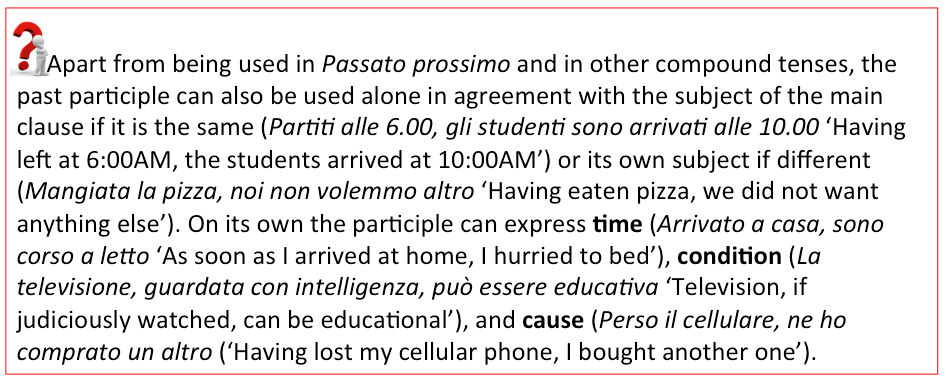Passato Prossimo and Past Participle
Passato Prossimo
The passato prossimo is a compound tense that expresses actions completed in the recent past (Ho appena mangiato ‘I have just eaten / I just ate’) but also an action that occurred long time ago (Dieci anni sono andato a Roma ‘Ten years ago I went to Rome’). The passato prossimo can be translated into English in different ways: Ieri ho mangiato la pizza ‘Yesterday I ate/ have eaten/did eat pizza’.
To form the passato prossimo two parts are necessary. The first part is called the auxiliary verb and it is either the present tense of avere (see next chapter) or essere (see Unit 6). The second part is called the past participle, a special form of the verb you want to make past.
Here are some common time expressions for use with the passato prossimo:
stamattina this morning (Stamattina mi sono alzato presto)
ieri yesterday (Ieri siamo partiti)
ieri mattina yesterday morning (Ieri mattina non sono andato a scuola)
ieri sera last night (Ieri sera ho fatto tardi a lavoro)
l’altro giorno the other day (L’altro giorno ho incontrato Maria)
l’altra settimana the other week (L’altra settimana siamo stati a sciare)
due/tre etc. giorni fa two/three/etc. days ago (Due giorni fa ho dato l’esame di fisica)
l’anno scorso last year (L’anno scorso abbiamo visitato Roma per la prima volta)
l’estate scorsa last summer (L’estate scorsa ha fatto molto caldo)
lunedì/martedì/etc. scorso last Monday/Tuesday/etc. (Sono stato a Parigi lunedì scorso)
un mese fa one month ago (Un mese fa tu hai preso la patente di guida)
una settimana fa one week ago (Una settimana fa Jessica è partita per l’Italia)
un anno fa one year ago (Giuseppe, hai comprato la tua auto un anno fa solamente?)
sempre always (Ho sempre fatto i miei compiti in tempo)
and two negative
non … ancora not yet (Non ho ancora mangiato)
non … mai never (Non sono mai stato in Italia)
N.B. In case of a negative time expression non precedes the auxiliary, the words che (Non ho avuto che questa casa ‘I’ve had no other home than this one’), nessuno (Non è partito nessuno ‘Nobody left’), and ancora or mai always follow it.
Past participle
Let’s go over the formation of the past participle. You simple remove the infinitive ending and apply the past participle ending as shown below:

There are many verbs that use an irregular past participle. Here some of them:
aprire (to open) aperto, bere (to drink) bevuto, chiedere (to ask) chiesto, correre (to run) corso, crescere (to grow up) cresciuto, dire (to say) detto, essere (to be) stato, fare (to do/make) fatto, leggere (to read) letto, mettere (to put) messo, morire (to die) morto, nascere (to be born) nato, prendere (to take) preso, rimanere (to remain, to stay) rimasto, rispondere (to answer) risposto, scegliere (to choose) scelto, scendere (to climb down, get off) sceso, scrivere (to write) scritto, spendere (to spend) speso, succedere (to happen) successo, vedere (to see) visto, venire (to come) venuto, vincere (to win) visto, vivere (to live) vissuto.
While the past participle of avere forms regurarly (avuto), the past participle of essere is irregular (stato).

![]() Write the past participle (regular and irregular) of the following verbs
Write the past participle (regular and irregular) of the following verbs ![]()
parlare , arrivare , vincere ,
bere , scrivere , mangiare , studiare , preferire , piacere , venire , rispondere , dire .
![]() Using
Using ![]() write the infinitive form of the following Englsih verbs and then make their regular past participle
write the infinitive form of the following Englsih verbs and then make their regular past participle ![]()
to receive >
to forgive >
to jump >
to earn >
to obtain >
to cite >


